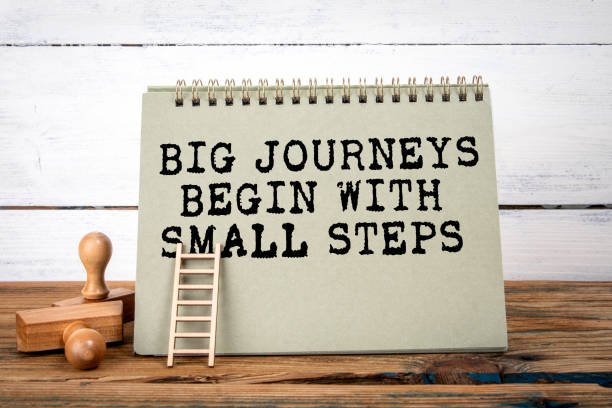Self Improver

Big Journeys Begin With Small Steps. Green notepad on wooden texture table and white background.
Becoming a “self improver” has become very important in our always changing environment. It speaks about those committed to improving many facets of their life, including general well-being and personal abilities. Self-improvement is a gratifying road regardless of your goals—new habits, better job chances, or just a more happy life. The idea of being a self-improver is discussed in this article together with the advantages it provides and doable actions to begin this transforming journey.
Understanding the Concept of a Self Improver
What Does It Mean to Be a Self Improver?
A self-improver is someone who actively searches for means to improve their quality of life. This can cover enhancing personal connections, emotional intelligence, physical wellness, or professional ability. The idea transcends mere learning; it’s about changing one’s perspective to respect ongoing progress. Active, self-driven, and always eager for fresh experiences and knowledge to enhance their life are self improvers.
The Importance of Self Improvement
Personal development and general life pleasure depend on one’s own improving efforts. It helps people to meet obstacles, reach their objectives, and lead more happy lives. Being a self-improvers involves assuming responsibility for your fate and choosing deliberately to raise your general well-being, knowledge, and abilities. It gives people direction and a feeling of purpose, therefore enabling people to confidently and resiliently negotiate the complexity of life.
The Journey of a Self Improver
Identifying Areas for Improvement
Finding which you wish to develop marks the first step on the path of a self-improvers. This calls for honest self-examination and knowledge of your advantages and disadvantages. Whether your areas of growth are in your professional possibilities, communication skills, or lifestyle choices, knowing particular areas that need work helps you to create well defined, reasonable objectives.
Setting SMART Goals
Developing SMART goals comes next once you have found areas needing work. These are specifically measurable, attainable, relevant, time-bound goals. A SMART goal, for instance, may be “I want to lose 10 pounds in three months by exercising three times a week and following a balanced diet,” instead of a nebulous one like “I want to get fit.” This method tracks advancement and offers a clear road map.
Developing a Growth Mindset
Any self-improver has to have a growth attitude. This kind of thinking is predicated on the conviction that work and education can help one to improve skills and intelligence. Those with a growth mindset are more inclined to welcome obstacles, keep on in the face of adversity, and view mistakes as chances for personal development. Developing a growth mindset helps you to see obstacles as stepping stones toward success rather than as roadblocks.
Practical Steps to Becoming a Self Improver
Continuous Learning
Self-improvement mostly depends on ongoing education. Formal education—that is, enrolling in classes or seminars—or informal learning—that is reading books, listening to podcasts, or viewing instructional videos—can both count here. The secret is to keep open to fresh knowledge and inquiring. A self-improvers never stops learning and are constantly seeking fresh chances to increase their knowledge and abilities.
Establishing Good Habits
Personal development depends fundamentally on good habits. This covers not only physical routines such consistent exercise and a balanced diet but also mental ones including mindfulness and stress management. Your mental and emotional health will much better if you create a schedule comprising meditation, journaling, or outdoor time. A self-improvers see the need of looking after the mind as well as the physical.
Productive Time Management
A self-improver must be adept in time management. You will maximize your time and energy by giving chores top priority and cutting off distractions. Time blocking, prioritizing, and applying productivity tools among other strategies help you remain focused and orderly. Time management is about more than just efficiency; it’s about matching your time with your values and objectives to guarantee you’re doing what really important to you.
Seeking Feedback and Reflecting
One useful instrument for personal development is feedback. It gives several points of view and thoughts on areas where you might develop. Getting comments from reliable friends, relatives, mentors, or colleagues will help you detect areas needing development and blind spots. Frequent self-examination also helps you to evaluate your development and make necessary corrections. A self-improving person sees constructive criticism as a chance for development rather than as something to fear.
Overcoming Common Challenges in Self Improvement
Overcoming Procrastination
One often encountered roadblock on the path of self-improvement is procrastinating. Fear of failure, lack of drive, or just plain overwhelm of the current work can all lead to it. Setting reasonable deadlines and breaking projects into smaller, more doable phases help one overcome procrastinating. Overcoming procrastination can also be achieved with the Pomodoro Technique, which calls for working in brief, concentrated bursts.
Handling Difficulties
The path of self-improvement is certain to include setbacks. Setbacks—from an unanticipated life event to a failed effort at a new habit—can be demoralizing. Still, a real self improver sees losses as teaching moments. Rather than demotivated, they examine what went wrong, grow from the experience, and make required changes. A good self improver is mostly resilient and persistent.
Keeping Up Motivation
Long term motivation can be difficult, particularly in cases of gradual growth. Maintaining motivation requires keeping your goals clear-cut and reminding yourself of the reasons you began your road of self-improvement. Celebrating little accomplishments along the road will also help to increase your spirit and drive. Surrounding oneself with positive influences—that of mentors or encouraging friends—may inspire you and help you stay on target.
The advantages of self improvement
Improved confidence and self-esteem
Confidence and better self-esteem are among the most important advantages of personal development. You get more confidence in your ability as you reach your objectives and advance in the selected areas. From your job to your personal connections, this fresh confidence can help in every sphere of your life.
Improved Physical and Psychological Health
Participating in self-improvement pursuits usually results in improved physical and mental health. Whether it’s by consistent exercise, mindfulness practice, or new skill acquisition, the process of bettering oneself affects general well-being holistically. Those who are self-improvers are more likely to participate in good habits and behave pro-actively to preserve their bodily and mental wellness.
Boosted Efficiency and Productivity
Many times, self-improvers discover that over time they grow more efficient and productive. They can achieve more in less time by improving their time management abilities, establishing well defined objectives, and removing distractions. Along with a more balanced existence, this higher production frees time for other interests including hobbies or time with loved ones.
A Sense of Purpose and Fulfillment
At last, being a self-improverer gives one great fulfillment and direction. Working constantly toward personal development helps you to match your activities to your passions and ideals. As you are actively seeking what most important to you, this alignment helps one to find more meaning and fulfillment in life.
Additional Aspects of Being a Self Improver
Developing Emotional Intelligence
Self-improvement depends critically on emotional intelligence (EQ). It entails your capacity to sympathize with others as well as your capability to understand, control, and communicate your emotions. Higher EQ will help you make better decisions, strengthen your communication abilities, and improve your interpersonal contacts. By developing self-awareness, exercising empathy, and learning to properly control stress, a self-improvers raises their emotional intelligence.
Increasing Your Comfort Zone
Being a self-improving person mostly requires your desire to venture beyond your comfort zone. Growing typically results from pushing oneself to explore novel activities and face your worries. This could entail picking up fresh tasks at the office, learning a new language, or perhaps even public speaking. Expanding your comfort zone helps you to develop resilience and adaptation in addition to new knowledge and abilities.
Developing Stronger Bonds
A happy existence depends on strong ties both personally and professionally. Being a skilled communicator, expressing gratitude, and providing support helps one to develop these relationships—that of a self-improvement. Although they take work and dedication, building and preserving good connections are absolutely vital for mental well-being and can offer a solid foundation in trying circumstances.
Consciousness and Mental clarity
Being totally present in the moment and conscious of your ideas and emotions is the technique known as mindfulness. By enabling you to remain focused, lower stress, and promote emotional control, it can significantly speed up your path of self-development. Methods such meditation, deep breathing exercises, and conscious observation can help you improve mental clarity and guide your more deliberate decisions.
The Role of Self-Care in Self Improvement
Being a self-improvers depends on self-care absolutely. It’s about spending time tending to your emotional, psychological, and physical wellbeing. This can involve regular exercise, eating healthy foods, appropriate sleep, and leisurely and joyful hobby participation. Maintaining general well-being and avoiding burnout depend on self-care; it is not a luxury.
Conclusion
A self-improving person’s path is one of lifetime dedication to personal progress. It calls for a growth mentality, a readiness to learn, and the bravery to meet problems squarely. Accepting the ideas of personal development can help you to reach your best and lead a more happy life. Recall that the road to become a self-improved traveler is one of constant learning and development rather than a destination. Thus, start your path to become the finest version of yourself today and go on.





